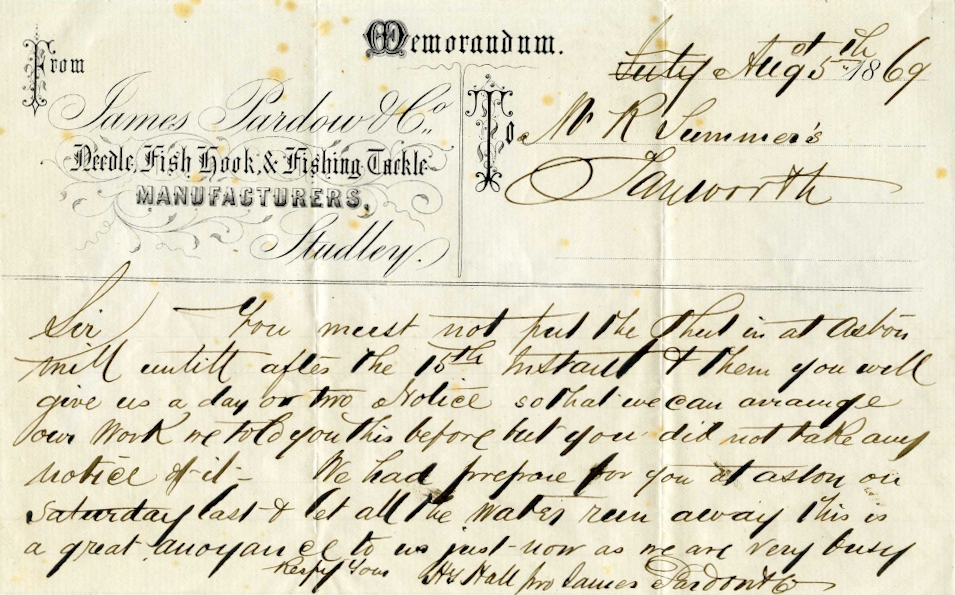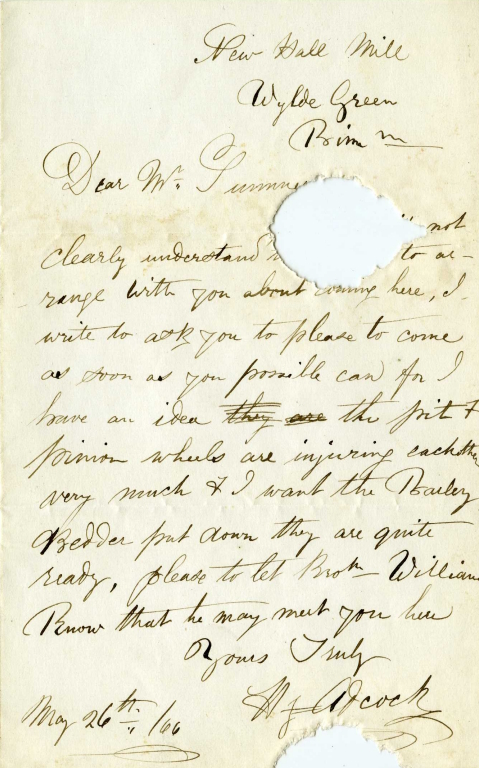| This article was written by volunteer Jamie Roberts |
 |
| Letter from James Pardow, Aston Mill, to Robert Summers, 1869 – DTNB-SUM-065 |
| The Summers letters are a unique collection of documents salvaged when a millwright’s workshops were converted into a garage in the late 1950s. They comprise mainly letters written by Robert Summers and his son, also called Robert, and letters written by their mill owner clients. Beginning in 1842, the letters document the activities of the millwrighting company in the town of Tanworth-in-Arden and surrounding areas in the County of Warwickshire. The workshop at Tamworth was in operation for 140 years and much has been written already about the firm by Tim Booth in the Midland Wind and Water Mill Group journal, from which much of the background for this will be taken. After Tim Booth’s death in 2022, the collection of letters was donated to the Mills Archive. This newsletter highlights some of the themes the letters draw out in relation to millwrighting. |
| Insights into family life |
| The millwrighting firm at Tanworth-in Arden was run first by Robert Summers and then by his son, Robert Summers Junior (b. 1819). The uniquely interesting aspect of the letters between 1842-1870 is the correspondence between Robert Summers and his wife. Unfortunately, we don’t have the wife’s letters in reply to those sent by Robert, making it a one-sided conversation. However, these letters still give a real sense of their family bond. In a letter written in March 1842, Robert writes: I write these few lines to you hoping you and little Sarah Ann are quite well…. Kiss my dear little Sally for me…Give my love to mother, father, Dinah and all my friends…and especially my love to yourself…your ever sincere and loving husband. This letter tells of the commitment by millwrights and their sacrifice with long hours away from loved ones, as another letter dated December 1848 demonstrates: I will try and get from here on Thursday morning if I can, but I am afraid I shall not…. Tell poor little Bill and the children I shall have a week with them at Xmas. Another letter dated 23 November 1869 shows the close bond between Robert and his brother as well as his family, when he hoped “that those at home that are ill soon get better, and those that are will keep so”. |
 |
| Letter from R G Handley, millstone maker, 1866 – DTNB-SUM-030 |
| Risks of the business |
| Millwrights could be prone to injury, both minor and major, to such an extent that it was part of day-to-day life. In a letter dated 19th December 1849, Robert mentions one such occasion at the end of a letter including preparations for Christmas and work commitments: I hurt my little finger very much Saturday week. I thought I had smashed it altogether but fortunately I had not, but it is not got well yet and if it does not by Xmas I shall not be able to ring [the bells]. Now must end by giving my best love to all of you from your sincere and loving husband. Another letter written by Robert to his parents, [12th November 1869] details a more serious injury: When I was helping the stone men dress the grey stones and a piece of stone flew in my eye. I have not been able to work since. I put some “Poor Man’s Friend” on it last night, and then a bread poultice wrapped up in muslin, but it did not seem any better this morning it was in most dreadful pain all the time up till dinner time when it worked out, so I think I shall be able to tackle two again in the morning. |
| A constant struggle for money |
| A letter dated 9 December 1849, suggests that although Robert was busy and in demand, he still didn’t have enough ready funds to pay for the basics: I don’t know whether I stands on my head or my heels often. I can only say this, if you had not sent me those things by the chap, I should not have had money to bought victuals with which I am very much obliged to you for doing so. In the same letter, we get a sense of the constant struggle Robert had in getting payments for work completed for mill owners and the problems this causes: This afternoon I have been to Mr. Thomas Adcock’s of Shustoke to be after some money, but he was not at home, and everything seems to go against me. I asked Mr Loud for some money on Friday last and he could not give me a shilling. I don’t know wat I shall do if I don’t get some soon, but I must turn out after some of the Adcock’s again someday. Quite often the letters would mention travelling to Birmingham. Tim Booth has suggested that this was where payments and debts were settled: “The location suggested in the letter (d. February 11 ’66) was the Birmingham Corn Exchange where millers would attend weekly to sell their goods. Robert would have frequently attended here hoping to settle payments and find further work.” Originally in the Bull Ring, the Corn Exchange moved to Carrs Lane in 1848 and this would be the location where Robert would ‘network’ with potential new customers and negotiate with current ones. This point is further demonstrated in a postscript written by Robert in 1882 “P.S. I can see you at your depot at the Corn Exchange tomorrow”. |
 |
| Letter from Mr Adcock of New Hall Mill, Sutton Coldfield, 1866 – DTNB-SUM-026 |
| Funny anecdotes |
| Whilst working with Robert’s collection of letters, a real sense of his light-hearted side and sense of humour can be found. A number of amusing anecdotes come through the pages. For example, in a letter dated 9 December 1849, Robert relates one such occasion to his wife: Thomas went to Birmingham last Saturday night was a week and he drawed some money which he hardly does when he is out and as he was coming to the station in Birmingham he walked right into the canal and it was a great mercy as he was not drowned and he was obliged to go back to William Coppages and change himself. This obviously amused Robert but mortified Thomas as he goes on to say “don’t mention it to anyone for he would not have Ester [Thomas’ wife] told of it for the world so I beg you don’t mention it for fear of doing her harm”. Other anecdotes give more detail of Robert’s family life away from millwrighting. He clearly takes a great interest in his family whilst he is away and is grateful for any bits of news from home. When his daughter wrote him a letter relating to her progress with her piano, Robert writes: She has made great improvement in her writing I am glad to see and I am certainly surprised she can play anything like a tune on the piano as I fancied she would be very awkward at it but I am certainly pleased at the progress she is making. [15 November 1854] However, in the same letter, Robert writes about the state of Sarah Ann’s shoes and what is to be done about them: I am sorry about her shoes, but Jane had better write to her immediately and tell her to get some more and I must do as you say and send her some more money at Xmas – if she cannot wear the shoes Mr. Hands made she must be barefoot. This may or may not be written in jest, but it also reflects the fact that the family budget was often stretched with the nature of the business finances being in a constant state of flux. It is clear that a number of unique and historically interesting themes can be revealed from the Robert Summers letters, from information about his family life and the day to day workings of a millwright, to the near constant financial worries and the struggle to keep financially stable. There are not many records relating to mill wrights from the 19th century and none quite so personal and covering such a long period of time. For this reason, it could be said that this makes the Robert Summers collection a nationally important one that is essential to preserve for the benefit of the public. You can view the Summers letter collection in our catalogue here: https://catalogue.millsarchive.org/letters-of-robert-summers-millwright |
